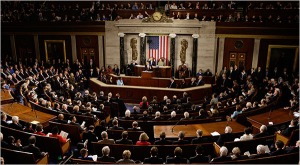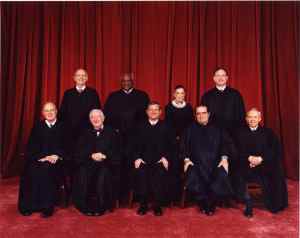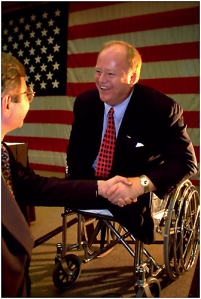Three Branches Separate, but Definitely not Equal
I hope you all had the opportunity to catch the State of the Union on Wednesday. If you frequent my blog, I assume you take interest in such things. However, if you found yourself otherwise engaged watching reruns of Snooki getting knocked out on Jersey Shore, I’ll fill you in on what happened (and if you’d like the chance to watch it yourself, I’ve provided the entire speech in the video below). Teaser: a replay of Obama’s swipes at the judiciary is equally entertaining, although admittedly less violent.
There was a clear focus in the 71-minute address (sixth longest in presidential history): jobs. Obama proposed an agenda that would key in on economic growth, development of green technologies and business practices, and tax incentives to companies willing to invest in the economy –all centered on creating jobs. Unemployment overwhelmingly dominated the early part of his speech (approximately 30 minutes), a move that seemed to please the conservative base that has eagerly awaited a shift away from healthcare.
Speaking of healthcare, it was addressed…briefly. Despite the issue’s pithy treatment, Obama did state that if Congress will not work to modify the healthcare system in America, he’ll consider invoking his executive power to see that changes are made.
Now it’s getting personal
He addressed the military’s “don’t ask, don’t tell” policy, promising to repeal the 1993 policy that forbids homosexuals from serving in the military. He also addressed what he termed “the deficit of trust,” and had strong words for a legislature that just can’t seem to get along. Rather than summarize, I’ll let Obama do the talking.
“We face big and difficult challenges. And what the American people hope – what they deserve – is for all of us, Democrats and Republicans, to work through our differences; to overcome the numbing weight of our politics.”
“Rather than fight the same tired battles that have dominated Washington for decades, it’s time for something new.”
“We have to recognize that we face more than a deficit of dollars right now. We face a deficit of trust – deep and corrosive doubts about how Washington works that have been growing for years.”
If you think Obama sent a strong message to the legislative branch, just wait until you hear what he had to say to the Supreme Court justices seated directly in front of him.
“With all due deference to separation of powers, last week the Supreme Court reversed a century of law that I believe will open the floodgates for special interests, including foreign corporations, to spend without limit in our election,” said Obama.
He continued “Well I don’t think American elections should be bankrolled by America’s most powerful interests, or worse, by foreign entities. They should be decided by the American people, and that’s why I’d urge Democrats and Republicans to pass a bill to correct some of these problems.”
Talk about a hung jury
Obama’s assertion ruffled the, well…ruffles adorning the robes of a few of the justices; most noticeably scathed was Justice Samuel Alito, who broke the centuries old tradition of Supreme Court stone-faced detachment during the address to noticeably mouth the words “that’s not true.”
Now if you haven’t already received a Facebook group invite asking you to join “Team Obama” or “Team Alito,” then allow me the opportunity to persuade you before you choose.
Much to the surprise of no one, Fox News immediately described Obama’s actions as reprehensible and unprecedented. This opinion is based on the principle that Supreme Court justices are appointed for life in order to facilitate an environment where their decisions are uninfluenced by outside political actors who could theoretically hold them accountable for making an unpopular decision. Traditionally, Justices go through a rigorous appointment process that makes a CIA background check look like 10-question survey. After they’re approved, they’re on until they retire or die.
Here’s where I have a beef with that logic. Our Constitution created three “separate but equal” branches of government that would act as watchdogs in case one of the branches decided to go rogue. This system was adopted from political theorist John Locke, who first described it in his Two Treatises of Government.
Our adoption of Locke’s theory required that we account for political influence and, sadly, corruption. The branch that protected the Constitution was the easiest target, and thus, became the only branch that is unimpeachable/un-punishable. I have no problem with that.
What I take issue with is the argument that their decisions cannot be criticized when, as was the case in this instance, personal political agendas dictate the course of the Court proceedings. The Court approached the plaintiffs and asked to rehear the case nine months ago, an extremely activist move that is almost unheard of in the annals of Supreme Court history. The 5-4 ruling essentially allows corporations the unlimited right to fund campaigns, even with stockholder shares, creating a scenario where your investments in a company could potentially be used to fund the campaign of a politician you don’t support.
The audacity of equality
Regardless of my feelings about the specifics of the case, the fact remains that the Supreme Court is being held in higher regard than either of the other two branches. Critics say Obama was rude to call out the justices who were in attendance as Obama’s guests. Does that mean the Congress should be untouchable as well? He sure was critical of them, and supposedly, they’re on the same plane as the Supreme Court. Does that mean Congress can’t criticize the President?
By the way, this isn’t the first time a President has been critical of a Supreme Court decision during his State of the Union address as some would have you believe, including columnist Mary Kate Cary of U.S. News and World Report.
“Imagine if Ronald Reagan had given a State of the Union address and turned to the justices in the front row to say that Roe v. Wade had been wrongly decided. Unlike this time, I don’t think the Democrats in the chamber would have stood and applauded.”
Unfortunately, Ms. Cary, Reagan did just that in both 1984 and 1988, criticizing the Supreme Court for its rulings on prayer in school and Roe v. Wade. You can find his comments in full at mediamatters.org.







